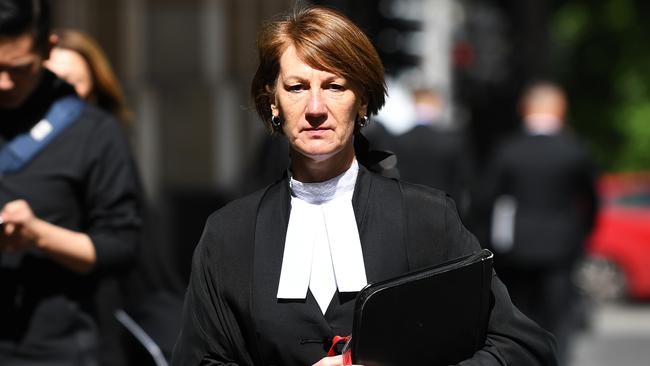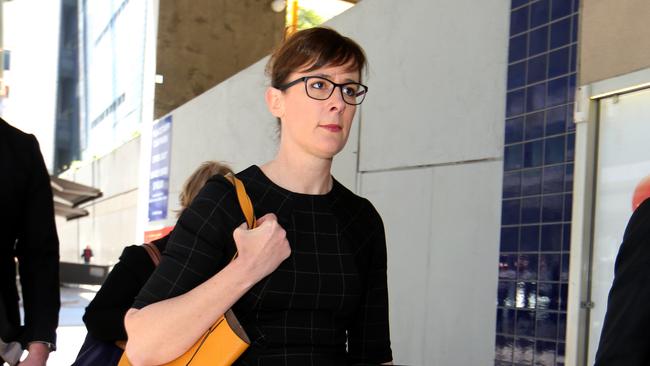
At the centre of the latest developments are two of Australia’s most eminent female silks——Kerri Judd and Rowena Orr—nicknamed around the nation as Rowena “Shock and Orr” after her brilliant role in the banking inquiry.
But also part of this new episode in the saga are senior politicians and public servants in the Victorian government, the Victorian occupational health and safety regulator, WorkSafe, and, most important of all, the need to continue to protect workers from industrial accidents around the state and perhaps the nation.
The “dramatic event” was a letter from Victoria’s Director of Public Prosecutions Kerri Judd, to WorkSafe Victoria.To convey the drama behind the letter I have to take you through the steps that led up to it.
The management breakdown that led to the 801 deaths started around February/March 2020 and WorkSafe has announced that it began investigating the situation in June 2020.
In September 2020, as allowed under the Victorian Occupational Health and Safety Act, Self Employed Australia and its executive director, Ken Phillips, guided by advice from top Australian OHS legal experts, used the provisions of the act to request prosecution of 16 people including current and former cabinet ministers and public servants.
In all, 142 prosecutions were requested under the 2004 Act, which was masterminded by former premier Steve Bracks. WorkSafe had nine months to either prosecute on each of the 142 grounds or explain why it was not prosecuting.
When the June 29, 2021 deadline was reached—just over five weeks ago—-WorkSafe claimed it needed more time to investigate despite the fact that a whole year had passed since it started investigating in 2020.
Self Employed Australia, as was its right under the act, then took the next step and required that Kerri Judd review the WorkSafe investigative material and provide WorkSafe with her written advice as to whether or not she believes that WorkSafe should prosecute.
The act appears very clear. Give the actions of Self Employed Australia, if WorkSafe has not made a decision within nine months of receiving the initial request to prosecute, WorkSafe is required to send all its investigative materials to the Director of Public Prosecutions for her review and advice.
Although it’s a matter for the courts, on the surface, by not sending its investigative materials to Judd, WorkSafe appears to be in clear breach of its own act.
It also raises the question of whether Kerri Judd, as Victoria’s Director of Public Prosecutions, is also in danger of being in breach of the act by not giving the answers she is required to do under the act.
And suddenly, given the grave issues that are raised, it will mean that Victoria’s Solicitor-General must also be involved.
Early last May Rowena Orr became Victoria’s Solicitor-General.
I do not know whether she knew before taking the appointment what could happen to the Director of Public Prosecutions on June 29 if WorkSafe did not comply with the act.
One can only imagine the tensions this stalemate has created. Thirty-six long days passed after the June 29 deadline. Suddenly Kerri Judd acted.
She sent a letter to WorkSafe on August 4 which was relayed to Self Employed Australia a day later on Friday, August 5.
The contents of both the Judd and WorkSafe letters are attached.
PDF: Letter to Ken Phillips
The key sentence in the Judd letter is: “The matter remains under investigation by WorkSafe Victoria. I cannot make a determination in this matter until I have reviewed the investigative materials.”
There is nothing in the act which explains what the Director of Public Prosecutions should do if WorkSafe does not comply with the act.
However there is a second sentence of importance: “I have made enquiries as to the progress with WorkSafe Victoria. Based in these enquiries I am satisfied that the investigation is progressing appropriately.”
To have the state’s two most senior legal officers in such a horrible bind is not sustainable and if it was to continue for an extended period it would break down the force of law in our second most-populous state.
The situation is made even more bizarre by the fact that the act provides that there is a two-year prosecution time limit. We presume that the time meter started in June 2020 but it could be taken back to March. Many believe that the “time clock” is the way WorkSafe, the politicians and the public servants hope to solve this dilemma .
Because of Kerri Judd’s letter and the involvement of Rowena Orr, if that is the intention, then I do not believe it is going to work.

I will leave the intricacies of the occupational health and safety act to another time but there is a fascinating deviation in occupational health and safety law from other laws of the land.
Like other laws, under OH&S, people can be prosecuted for what they do but unlike other laws people can also be prosecuted for what they do not do.
As a result there are a very different set of laws. In time that difference will become very important in the politics of Victoria and the nation.




As a result of a dramatic event at the weekend, the repercussions from Australia’s largest industrial accident, the deaths of 801 people as a result of the Victorian hotel quarantine blunders, are now set to escalate dramatically.